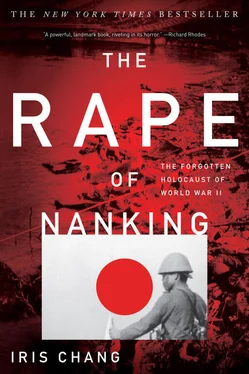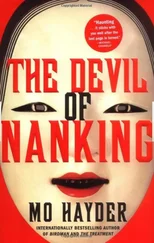In the midst of this ordeal, three committee members drove up: the YMCA secretary George Fitch, the Nanking University sociology professor Lewis Smythe, and the Presbyterian missionary W. Plumer Mills. The soldiers forced the three men to stand in line and frisked them for pistols. Suddenly they heard screams and cries and saw the Japanese dragging women out of the side gate. It was only then that Vautrin realized that the entire interrogation was a ploy to keep the foreigners at the front gate while other Japanese soldiers searched the campus for women to rape. “Never shall I forget that scene,” she wrote, remembering her rage and helplessness: “The people kneeling at side of road, Mary, Mrs. Tsen and I standing, the dried leaves rattling, the moaning of the wind, the cry of women being led out.”
For the next few months, Vautrin often found herself one of the sole defenders of the refugee camps at Ginling College. Japanese soldiers constantly harassed the refugees there by rounding up men for execution or women for military brothels. Sometimes their recruitment tactics were brazen. On at least one occasion Japanese soldiers drove up to campus with a truck and asked for girls. Most of the time, however, the kidnapping of women for rape was done covertly. Soldiers jumped over bamboo fences at night or broke open the side or back gates to seize random women in the darkness—expeditions that began to be known throughout the populace as “the lottery.”
On New Year’s Day 1938, Vautrin rescued a girl whom a soldier had dragged into a bamboo grove north of the library. On several occasions her heroism nearly cost Vautrin her life. Many of the soldiers were “fierce and unreasonable” toward her, brandishing bayonets reddened with fresh bloodstains. Vautrin wrote that “in some cases they are defiant and look at me with a dagger in their eyes, and sometimes a dagger in their hands.” One time, when she tried to stop Japanese soldiers from looting, one of them aimed a gun at her.
Sometimes in her dealings with the Japanese, Vautrin made mistakes. Just as Rabe and the other committee members had been duped by the Japanese into handing over men for execution, Vautrin appears to have been duped into delivering innocent women into the arms of Japanese soldiers. On December 24, Vautrin was summoned to her office to meet with a high Japanese military officer and an elderly Chinese interpreter, who discussed with her the Japanese army’s need for prostitutes. “The request was that they be allowed to pick out the prostitute women from our ten thousand refugees,” Vautrin later wrote of the meeting in her diary. “They said they wanted one hundred. They feel if they can start a regular licensed place for the soldiers then they will not molest innocent and decent women.”
Strangely enough, Vautrin granted the request. Perhaps she had no choice in the matter, or perhaps she actually believed that once the Japanese left with the prostitutes for their military brothel they would stop bothering the virgins and respectable matrons in the refugee camps. Whatever the reasons behind her decision, it is safe to assume that Vautrin made it under pressure. She waited while the Japanese conducted their search and after a long time they finally secured twenty-one women. How the Japanese were able to distinguish these women as prostitutes Vautrin does not say, but she did mention that the Japanese were dissatisfied with the result because they were convinced that more prostitutes were hiding somewhere in the zone. “Group after group of girls have asked me if they will select the other seventy-nine from among the decent girls—and all I can answer is that they will not do so if it is in my power to prevent it,” she wrote.
A week after the city fell, the Japanese began a systematic effort to regulate activity within the zone. The commander of the military police of the Japanese army made a proclamation, effective December 24, dictating that all civilians obtain passports (also called “good citizen’s papers”) from the issuing office of the Japanese army. No one was allowed to get a passport for someone else, and those without passports would not be allowed to live within the Nanking city walls. The military posted bulletins in the streets notifying people to register or face the risk of being executed.
On December 28, registration of the men began. At Ginling College they formed lines of four, received copies of forms, and marched to a house at the northeast corner of the campus where the Japanese recorded their names, ages, and occupations. Vautrin noticed that the men who arrived for registration were mainly old or maimed because most of the young men had already fled the city or been killed. Among those who showed up, more men were taken away as ex-soldiers, leaving behind old men and women who wept and kneeled before the Safety Zone leaders, begging them to secure the release of their husbands and sons. In a few cases the zone leaders were successful, but they noticed that the Japanese military officials were growing increasingly resentful of their interference.
When the turnout of men for registration disappointed the Japanese, they tried to intimidate the populace into compliance. On December 30, they announced that all who had not been registered by 2:00 P.M. the following day would be shot. “This proved to be a bluff,” one missionary wrote of the incident, “but it frightened the people.” The next morning huge crowds of people dutifully appeared at the registration areas, many of whom had risen before 3:00 A.M. to ensure their place in line. The Draconian threats of the Japanese had instilled such fear that by January 14 the authorities succeeded in registering at least 160,000 people.
Then registration began for the women. At 9:00 A.M. on December 31, thousands of Chinese women gathered in front of the Central Building of Ginling College, where a Japanese military official lectured to them. Speeches were given first in Japanese, then translated into Chinese by an interpreter: “You must follow the old customs of marriage,” Vautrin recalled them saying. “You must not study English or go to theatres. China and Japan must be one.” The women were then marched single file in two lines through frames set up for selling rice, where they were given tickets. Vautrin observed that the Japanese soldiers seemed to get a great deal of amusement herding the women about like cattle, sometimes putting the stamp on their cheeks. The soldiers also forced the women to smile and look happy for Japanese newsmen and photographers, even though the mere prospect of registration had made some women literally ill with fear.
At times the Japanese registration of Chinese women seemed to Vautrin nothing less than a full-scale inspection of the most attractive candidates for rape. On the very first day of female registration, the Japanese scrutinized certain women in the zone and tried to take them away. They had singled out twenty girls, no doubt for prostitution, because they had curled hair or dressed too well. But all were released, Vautrin later wrote, “because a mother or some other person could vouch for them.”
After registration, the Japanese tried to eliminate the zone itself. In late January the Japanese announced that they wanted everyone out of the camps and back into their homes by the end of the month. February 4 was given as the deadline for evacuation. When the deadline arrived, Japanese soldiers inspected Ginling College and ordered the remaining girls and women to leave. When Vautrin told the inspectors that they could not leave because they were from other cities or their homes had burned down, the Japanese announced that the military police would assume the responsibility of protecting them. Vautrin was wary of these promises, and even the Chinese interpreter who came with the Japanese to deliver their messages whispered to Vautrin that he felt the young women were not safe and should continue to stay where they were.
Читать дальше











